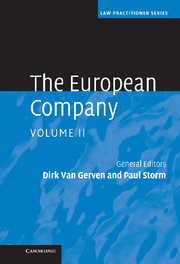15 - Liechtenstein
from Part II - Application in each Member State
Published online by Cambridge University Press: 06 July 2010
Summary
Introduction
Although not a Member State of the European Union, Liechtenstein has ratified the European Economic Area (EEA) Agreement and has been a party thereto since 1995. Consequently, Liechtenstein has had to bring its national laws into line with Council Regulation (EC) No 2157/2001 on the Statute for a European company (the ‘Regulation’). Furthermore, Liechtenstein has transposed into national law Council Directive 2001/68/EC of 8 October 2001 supplementing the Statute for a European company with regard to the involvement of employees (the ‘Directive’).
In November 2005, the Liechtenstein Parliament passed legislation implementing the Regulation, i.e. the SE Act (Gesetz über das Statut der Europäischen Gesellschaft or SEG), and the Directive, the SE Employee Involvement Act (SEBG). Along with this key legislation, which entered into force in February 2006, the Persons and Companies Act (Personen- und Gesellschaftsrecht or ‘PGR’), the Banking Act (Bankengesetz), the Investment Undertakings Act (Gesetz über die Investmentunternehmen), and the Insurance Surveillance Act (Versicherungsaufsichtsgesetz) all had to be amended in order to bring them into line with the Regulation and the Directive.
Formation
General remarks
Founding parties
The choice of how to form an SE (i.e. by merger, through the formation of a holding or a subsidiary SE or by conversion of a national company into an SE) will also determine the identity of the founding parties.
- Type
- Chapter
- Information
- The European Company , pp. 391 - 410Publisher: Cambridge University PressPrint publication year: 2008

